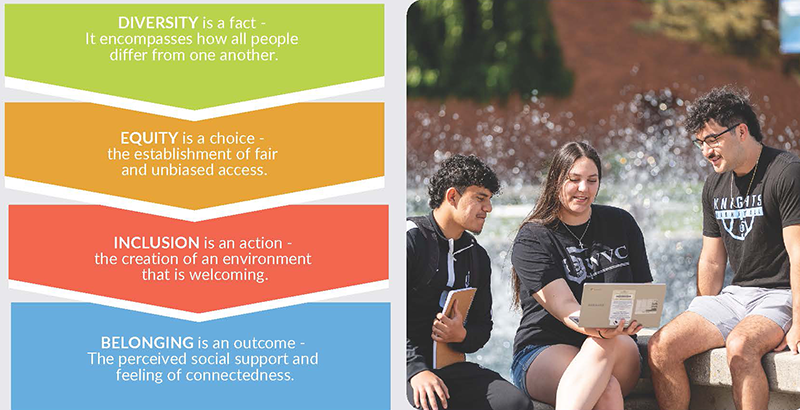Center for Excellence and Inclusive Belonging
The Center for Excellence and Inclusive Belonging (CEIB) at Wenatchee Valley College is established to lead, advocate, and implement initiatives that promote diversity, equity, inclusion, and a sense of belonging for all members of the college community. This charter outlines the mission, vision, values, functions, responsibilities, goals, and strategies of the CEIB.
Mission Statement
The Center for Excellence and Inclusive Belonging (CEIB) at Wenatchee Valley College is dedicated to promoting diversity, equity, inclusion, and belonging in all aspects of our college community. We aim to foster a welcoming, inclusive, and equitable environment where all individuals are valued, respected, and provided with opportunities for personal and academic growth.
Vision
Our vision is to be a model institution for inclusive excellence, where every individual is empowered to thrive, contribute, and lead in a diverse and interconnected world.
Slogan
“Belonging Redefined, Excellence Unleashed”
Diversity, Equity, Inclusion, and Belonging Framework

Intersectionality 101
The term "intersectionality" is used here to reference the interconnected nature of identities, both group and individual.
All aspects of a person's identity--race, gender, sexual orientation, class, abilities, etc.--are informed and impacted by another, placing individuals as the nexus of multiple systems of privilege and oppression.
"Intersectionality [creates] overlapping and interdependent systems of discrimination or disadvantage." ~ Dr. Kimberle W. Crenshaw
How do we advance this work?
The 4 Lenses of System Oppression: sharpen our focus on the ways in which any given form of oppression (race, gender, class, language, sexual orientation, etc.) may be negatively impacting people's ability to thrive.
- Individual Oppression: A person's beliefs and actions that serve to perpetuate oppression.
- Interpersonal Oppression: The interactions between people, both within and across difference.
- Institutional Oppression: Policies and practices at the organization (or "sector") level that perpetuate oppression.
- Structural Oppression: How these effects interact and accumulate across institutions and across history.
Move toward accompliceship instead of allyship
Ally: Mostly engage in activism by standing with an individual or group in a marginalized community. An ally in the workplace might call out a biased comment during a meeting, ensuring that a marginalized colleague feels supported.
Accomplice: Focus more on dismantling the structures that oppress that individual or group; such work is directed by stakeholders in the marginalized group. An accomplice might work to overhaul hiring practices or advocate for systemic changes to create equitable opportunities for underrepresented employees.


